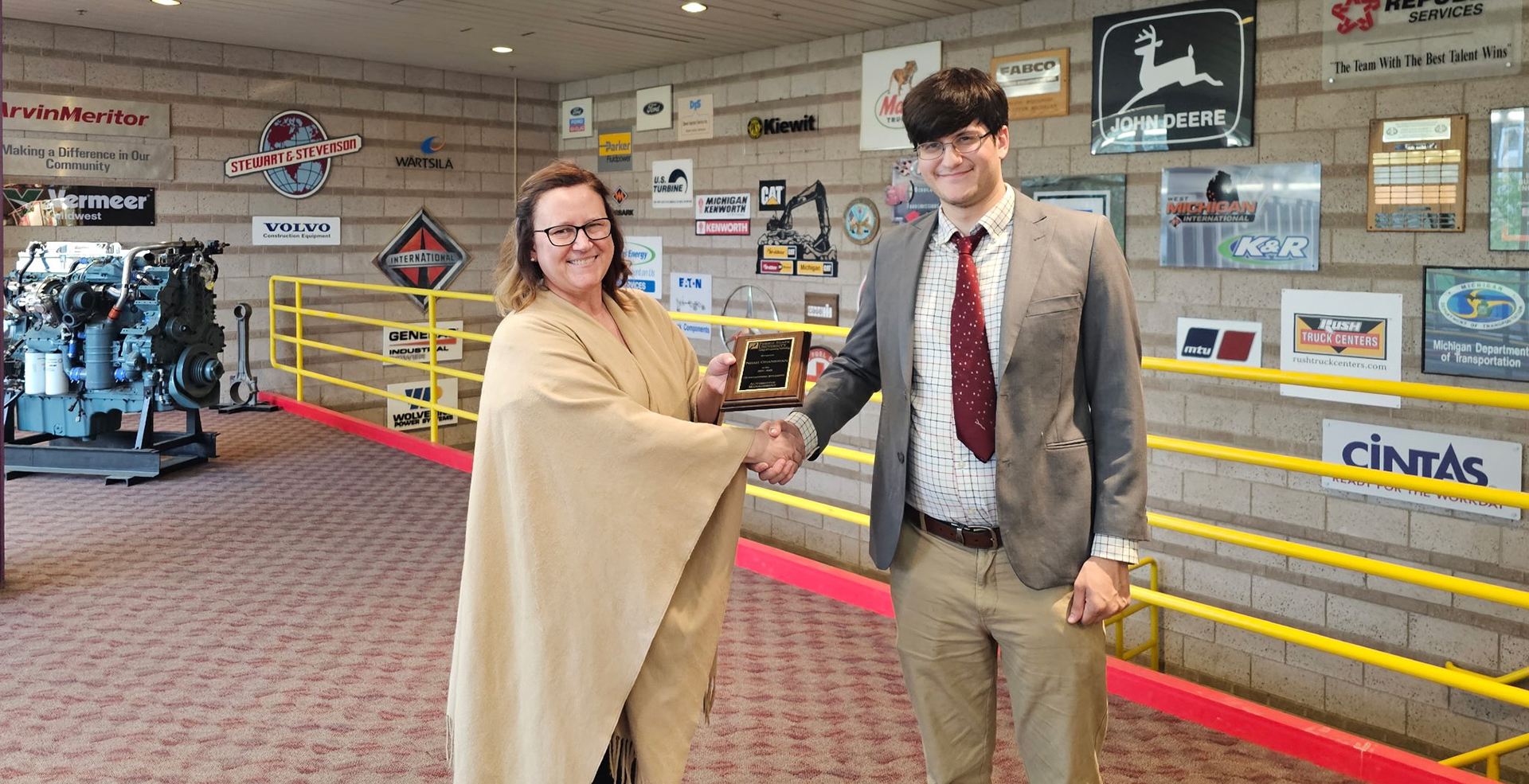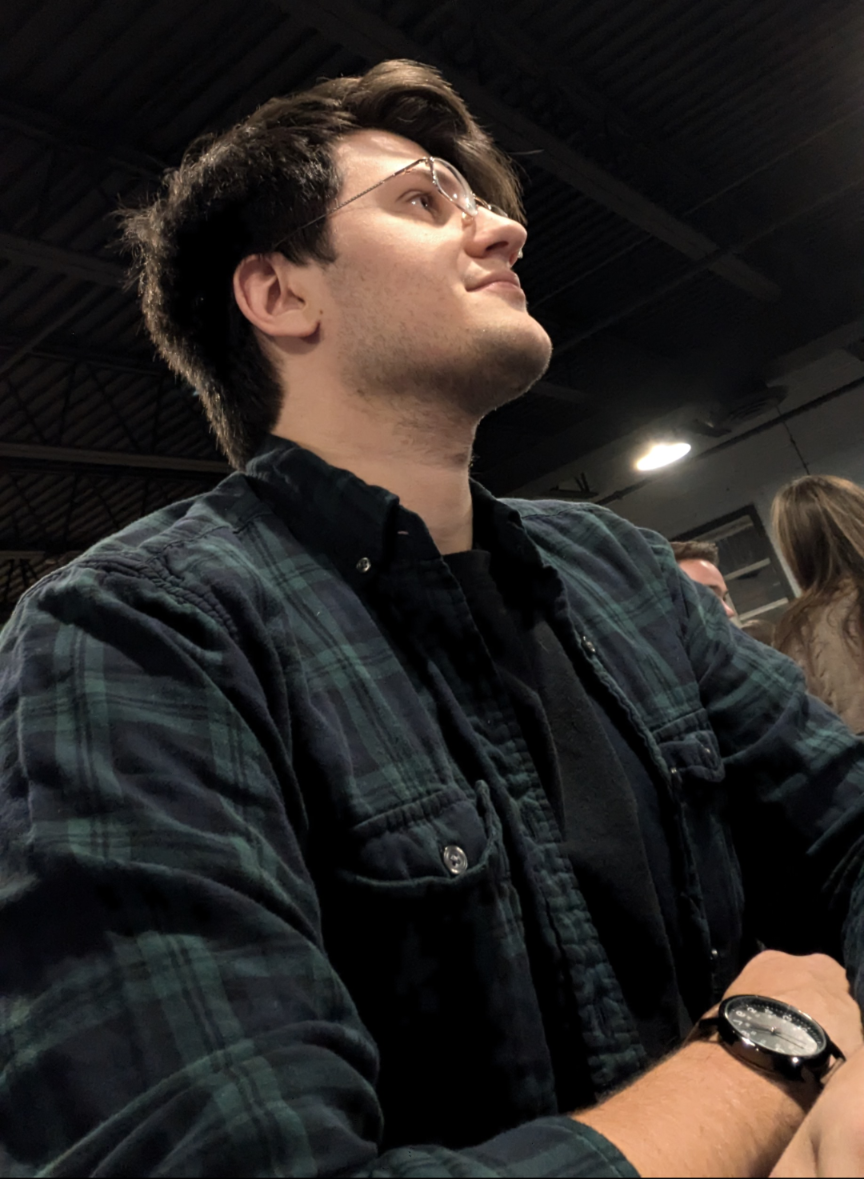Aug. 27, 2025
From Classroom to Careers: Automotive Management student Noah Ohanesian finds a path from Ferris State to Rolls-Royce

When Noah Ohanesian walked into Ferris State University’s Automotive Management program, he already had grease under his fingernails and a knack for fixing engines.
What he didn’t yet know was how that technical background could open doors into the business side of the automotive world — or that he’d end up contributing to efficiency improvements for one of the most prestigious power systems companies in the world.

Noah Ohanesian
“I picked my major as it was a natural progression from the Automotive Technician program at Grand Rapids Community College,” Ohanesian said. “It was the next step, moving from hands-on work with vehicles into management, culture and the bigger picture of the industry.”
Ohanesian grew up in West Michigan, graduating from Forest Hills Central High School after spending his early childhood in Florida and Illinois. He’s finishing his senior year at Ferris State with a degree in Automotive Management and Marketing.
The choice to come to Ferris State was influenced by several of his professors at GRCC who had earned their own degrees from the university. Their enthusiasm for the program convinced him it was the right fit.
That decision has led him on a journey that bridges classroom learning with global industry exposure, a journey that confirms just how much a Ferris State education can shape a career.
This past summer, Ohanesian took part in his first internship, joining Rolls-Royce Power Systems’ U.S. division in Novi. For nearly four months, from mid-May through August, he immersed himself in corporate life and the real-world demands of the mobility sector.
“I wanted to get a real-world experience of what my degree has to offer,” he said. “The internship class is a great way to test drive your degree.”
His assignments were from far from routine busy work. He was tasked with submitting solicitations for the Defense Logistics Agency, entering extended coverage contracts into the company’s SAP system, and assisting Reman Sales with comparing and creating Bills of Materials for remanufactured engine sales. Along the way, he gained technical knowledge about the company’s core products, including its Series 1600, 2000 and 4000 engines.
“I learned a lot about the products Rolls-Royce has to offer, but also how to navigate SAP — something I had never done before,” Ohanesian said. “And I learned what it was like to work in a corporate setting. I really enjoyed interacting with new people every day, working with the service sales team and just how much I was able to learn from the experience.”
The experience was so positive that Ohanesian is continuing on with the company through the fall semester as a co-op while finishing his degree. Long term, he hopes to pursue a career in after-sales support for internal combustion engines and vehicles, a role that would allow him to combine his technical background with his management training.
Michele Harvey, associate professor of Automotive Management at Ferris State, wasn’t surprised by Ohanesian’s success.
“Noah was our AMGT Student of the Year last year, so I had zero doubt he’d excel,” Harvey said. “His supervisor at Rolls-Royce had nothing but praise, even crediting him with helping implement efficiencies that improved their operations. That’s the kind of impact we want our students to have. He represented Ferris and the program exceptionally well.”
For Harvey, Ohanesian’s experience at Rolls-Royce exemplifies what the Automotive Management program is designed to do: give students the skills, confidence, and industry connections to make an immediate impact.
“The internship is the bridge between the classroom and the career,” she explained. “Internships prove that students can take their knowledge and make an impact in the workplace. They also give students a chance to explore potential employers, understand professional expectations and bring back valuable insight on industry trends.”
Harvey knows the value of the program firsthand. A Ferris alumna, she returned to the university to teach after a career with John Deere Company, where in her last position she managed $27 million in R&D projects and led global product teams across seven countries.
That experience, she said, gave her a broad view of business operations and the ability to translate classroom concepts into real-world application.
“I make sure our students face real challenges before they graduate, realistic scenarios and real-world business cases that require them to apply what they’ve learned in practical, problem-solving ways,” she said. “The future of mobility demands agility, and we build that skillset here.”
She points to the program’s deep industry ties as one of its greatest strengths. From an active advisory committee to a wide alumni network, Ferris students connect with companies and professionals in ways that accelerate their career paths. Graduates have gone on to leadership roles in service management, marketing and sales, finance, research and development, and now, in emerging mobility technologies.
“For me, it was about opportunity,” Harvey said of her own decision to attend Ferris as an undergraduate. “Ferris offered a degree that opened doors across the transportation industry. Now, as we embrace the future of mobility, those doors are multiplying.”
For Ohanesian, the doors have already begun to open. His recognition as Student of the Year, his strong performance in the classroom and his summer experience at Rolls-Royce have all positioned him for a career that blends technical knowledge with business leadership.
“After-sales support for internal combustion engines and vehicles is what I want to do with my career long term,” he said. “There are many different options for this career path, and this is what I’ve been pursuing given my background in automotive service.”
Harvey sees students like Ohanesian as the future of the industry: ready to adapt to new technologies while building on traditional strengths.
“As we shift our focus from transportation to mobility, we’re positioning graduates for an industry that’s evolving at record speed,” she said. “The future will bring new vehicle technologies, advanced data-driven services, and sustainable solutions. And our students are ready to lead the way. The next big idea in mobility could very well come from a Ferris graduate.”
Stories like Ohanesian’s are common, Harvey added. She recalled one graduate who started sweeping floors in a local parts store before working his way up to sales and management tasks. After completing the program at Ferris, he eventually purchased the business. His secret? The proposal he used to buy the company was based directly on his senior project in Harvey’s AMGT 401 class, a business plan that only needed minor updates before it was ready to present to the bank.
“That’s how directly classroom work can translate into real-world success,” Harvey said. “It’s not just education for education’s sake. Our students leave here ready to take on real responsibilities.”
As Ohanesian looks ahead to graduation, he carries both the technical grounding and business preparation that the program instills. For him, the internship at Rolls-Royce wasn’t just about a summer job. It was about finding a career path where he can contribute, innovate and grow.
“I look forward to graduating at the end of this year,” he said. “Ferris has given me the tools and the opportunities to get to this point.”

